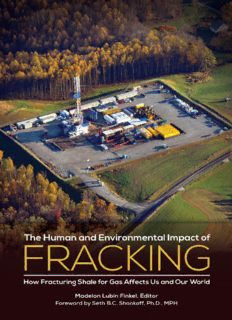
The Human and Environmental Impact of Fracking: How Fracturing Shale for Gas Affects Us and Our World PDF
Preview The Human and Environmental Impact of Fracking: How Fracturing Shale for Gas Affects Us and Our World
The Human and Environmental Impact of Fracking This page intentionally left blank The Human and Environmental Impact of Fracking How Fracturing Shale for Gas Affects Us and Our World Madelon L. Finkel, Editor Public Health Issues and Developments Copyright © 2015 by Madelon L. Finkel All rights reserved. No part of this publication may be reproduced, stored in a retrieval system, or transmitted, in any form or by any means, electronic, mechanical, photocopying, recording, or otherwise, except for the inclusion of brief quotations in a review, without prior permission in writing from the publisher. Library of Congress Cataloging-in-Publication Data The human and environmental impact of fracking : how fracturing shale for gas affects us and our world / Madelon L. Finkel, editor; foreword by Seth B.C. Shonkoff, PhD, MPH. pages cm. – (Public health issues and developments) Includes bibliographical references and index. ISBN 978-1-4408-3259-8 (alk. paper) — ISBN 978-1-4408-3260-4 (ebook) 1. Hydraulic fracturing—Environmental aspects. 2. Hydraulic fracturing— Health aspects. I. Finkel, Madelon Lubin, 1949- TD195.G3H86 2015 363.738'7–dc23 2014041811 ISBN: 978-1-4408-3259-8 EISBN: 978-1-4408-3260-4 19 18 17 16 15 1 2 3 4 5 This book is also available on the World Wide Web as an eBook. Visit www.abc-clio.com for details. Praeger An Imprint of ABC-CLIO, LLC ABC-CLIO, LLC 130 Cremona Drive, P.O. Box 1911 Santa Barbara, California 93116-1911 This book is printed on acid-free paper Manufactured in the United States of America To my late father, Ralph Lubin, who so enjoyed hiking in upstate New York. This page intentionally left blank Contents Foreword ix Seth B.C. Shonkoff Acknowledgments xi Introduction xiii Madelon L. Finkel 1. Potential and Known Health Impacts Associated with Unconventional Natural Gas Extraction 1 Jerome A. Paulson and Veronica Tinney 2. The Public Health Risk of Endocrine Disrupting Chemicals 23 Adam Law 3. Impacts of Shale Gas Extraction on Animal Health and Implications for Food Safety 35 Michelle Bamberger and Robert E. Oswald 4. The Importance of Health Impact Assessments 49 Liz Green 5. Natural Gas Development and Its Effect on Air Quality 61 Nathan P. De Jong, Roxana Z. Witter, and John L. Adgate 6. Implications of Unconventional Gas Extraction on Climate Change: A Global Perspective 81 Philip L. Staddon and Michael H. Depledge viii Contents 7. Community Impacts of Shale-Based Energy Development: A Summary and Research Agenda 95 Kathryn J. Brasier and Matthew Filteau 8. Risks beyond the Well Pad: The Economic Footprint of Shale Gas Development in the United States 115 Susan Christopherson 9. The Regulation of Shale Gas Development 131 Kate Sinding, Daniel Raichel, and Jonathon Krois 10. The Ethics of Shale Gas Development: Values, Evidence, and Policy 155 Jake Hays and Inmaculada de Melo-Martín 11. An Industry Perspective on the Benefits and Potential Community Health Risks Related to Unconventional Resource Development 173 Dennis J. Devlin 12. The Geology and Sustainability of Shale 195 J. David Hughes 13. Epilogue 207 Anthony R. Ingraffea About the Editor 217 About the Contributors 219 Index 225 Foreword Since the early 2000s, the use of hydraulic fracturing and directional drill- ing as a means to extract natural gas and oil from shale source rocks and other tight geological formations has grown rapidly. Since then, more than 30 states in the United States have opened their doors to this controversial unconventional gas extraction (UGE) process. UGE has created both ex- citement and fear in areas across the United States (especially in areas where drilling is planned) and increasingly around the world. Proponents cite the benefits of natural gas compared with coal for electricity genera- tion, the purported abundance of the resource, and the potential economic opportunities it affords on the local and national level. Conversely, oppo- nents cite concerns about the climate impacts of associated methane and carbon dioxide emissions, impacts on water quantity and quality, air- quality degradation, and increased population health burdens. Questions regarding the technically recoverable quantities of natural gas from un- conventional reservoirs also continue to be points of disagreement. UGE—most notably the forms that require higher fluid volumes—is a highly industrial process, requiring land, large quantities of water, chemi- cals, and ancillary infrastructure to transport, process, and dispose of ma- terials and manage the sizable waste stream. Central to the construction of sound energy policy is the tenet that rigorous scientific inquiry and moral and ethical considerations should inform such decisions. These consider- ations are particularly salient in cases with persistent data gaps and high economic, community, and environmental and public health stakes, as is the case for UGE. For instance, although the assertion that every gas well poses risks to drinking water supplies is unfounded, statements that gas development poses no risk to drinking water supplies are also erroneous.
